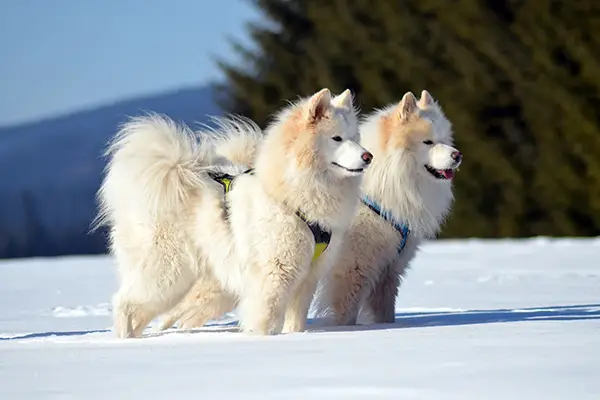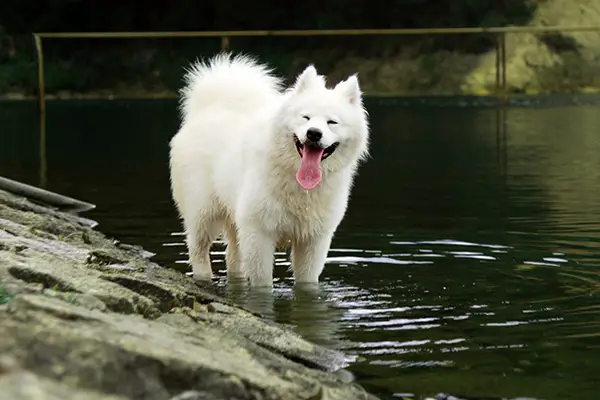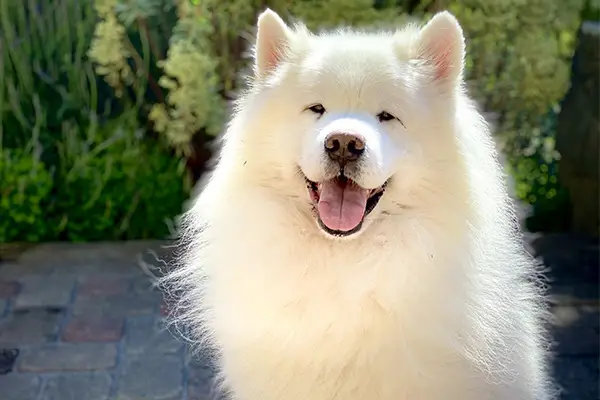Samoyeds are large-sized dogs known for their impressively white coat and wide smiles. Despite their cute appearance, these dogs are sturdy and make excellent sled dogs as well. The Samoyed has erect ears, a broad head, and a fluffy whitetail.
They make excellent family pets, and they can surely brighten anyone’s day with their trademark smile. But, to keep these dogs happy, they need a lot of love and attention from family. They thrive for human companionship, and if it’s not given to them, they’ll find ways to complain.

Samoyed Statistics
| Dog Breed Group | Sporting |
| Breed Size | Medium to Large |
| Height | 21-23.5 inches (male); 19-21 inches (female) |
| Weight | 45-65 pounds (male); 35-50 pounds (female) |
| Lifespan | 12-14 years |
Samoyed Ratings
| Energy level | |
| Exercise needs | |
| Requires attention | |
| Playfulness | |
| Trainability | |
| Shedding | |
| Grooming | |
| Friendly with family | |
| Friendly with kids | |
| Friendly with strangers | |
| Friendly with other dogs | |
| Prey Drive |
History
Samoyeds belong to one of the most ancient dog breeds from a nomadic tribe, Samoyede, in Siberia. Their original purpose was to herd reindeers and pull sleds as the tribe needed.
For centuries, the Samoyed dogs have remained exclusive for the tribe. But by the 18th century, the dogs were introduced to England by English Arctic adventurers. Queen Alexandra was one of the most known admirers of the breed, and she is also one of the most responsible for introducing the dog breed in dog shows.
In 1906, the American Kennel Club officially registered its first Samoyed dog. And when 1923 came, the Samoyed Club of America was formed.
Temperament
Samoyed dogs are known to be adaptable, friendly, and gentle dogs. They are very affectionate with his family, and even to children of any age. They thrive in human companionship, and they certainly love joining in family activities.
With his playful attitude, the Samoyeds shouldn’t be left alone for long periods. They need attention, exercise, and play. It’s in your benefit if you get him so tired; that way, he behaves well.
Their attitude to strangers varies from friendly to polite. The Samoyeds may bark, but they are never aggressive. They make excellent watchdogs, alerting you when someone suspicious comes by.
The Samoyed’s hunter instincts make them chase small animals – this could be a cat or any wildlife trespassing. If you have other pets at home, early socialization is essential to keep him well-rounded. This way, he’ll get used to new sights, sounds, people, and animals.
Training can be challenging too. These dogs are independent and demanding, so you must always be consistent.

Samoyed Care Requirements
- Nutrition: Samoyed dogs are high energy dogs and require a well-balanced meal to be healthy and happy. It should also contain essential nutrients such as protein, carbohydrates, fats, vitamins, and minerals. Watch your dog’s daily calorie intake. This will help maintain his weight and decrease the risk of any health problems. About 1.5 – 2.5 cups a day, divided into several servings, should suffice. For puppies, protein should be around 22 to 24 percent, while fat is about 12 to 15 percent. This should lessen as they grow older. Make sure only to buy high-quality ingredients. And if you’re going for dog food, make sure it doesn’t contain fillers, by-products, and artificial flavoring and coloring.
- Grooming: Samoyeds have a double coat that sheds at least twice in a year. However, they require a lot of brushing, so it remains luscious. Brushing also helps remove dirt, mats, and loose hair than can spread on your floor and furniture. You can give them an occasional bath. These dogs don’t have a doggy smell, so you can schedule baths depending if they get too dirty. Nails should be kept short so that they won’t be in any pain or discomfort. Clean their ears regularly as well to avoid ear infection.
- Exercise: As highly energetic dogs, Samoyed dogs require daily exercise. Daily walks should suffice, but they’ll enjoy playtime more. You can create some family activities that you can do with him. Just make sure that the area is secured so he won’t stray away.
- Health: Samoyeds are generally healthy dogs, but they too are prone to some diseases common to their breed. Watch out for eye conditions, the common hip dysplasia, hypothyroidism, patellar luxation, diabetes mellitus, and cancer. There’s also one disease called Samoyed Hereditary Glomerulopathy, which is a disease that affects their kidney. Most of these diseases are genetically transferred, so it would greatly benefit you if you check their parents to see if they have existing conditions. Screening tests are also available on some diseases, so you might want your dog to take one.
- Lifespan: The life expectancy of Samoyed dogs is 12-14 years.
Famous Samoyeds
- Kaifas and Suggen: Two Samoyed lead dogs for Fridtjof Nansen’s North Pole expedition.
- Etah: Lead dog for the expedition to the South Pole; the first to reach the pole
- Mush: The Samoyed dog owned by Karen Carpenter
- Little Bastard: The Samoyed dog of Denis Leary
- Maya: The most famous Samoyed dog on Instagram; she now has 1.9 million followers

Fun Facts about Samoyeds
- The Samoyed belong to one of the oldest dog breeds.
- They are believed to have come from Siberia.
- These dogs were originally used to herd reindeers.
- They are cat-like in terms of grooming themselves.
- Their smile is a trademark to the breed, and it’s named “Sammy’s smile.”
- They go by many names: Bjelkier, Samoiedskaya Sobaka, and Nemetskaya Laika
- They were officially registered by the American Kennel Club in 1906.
- Queen Alexandra of Denmark loved the breed.
- Samoyed dogs lead expeditions to the North and South Poles.
